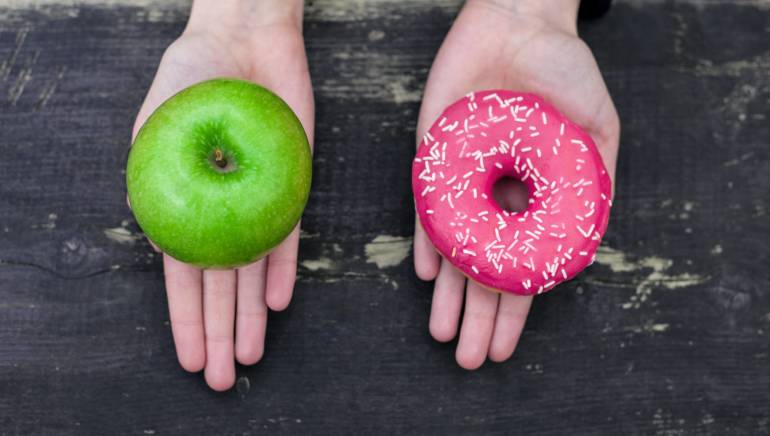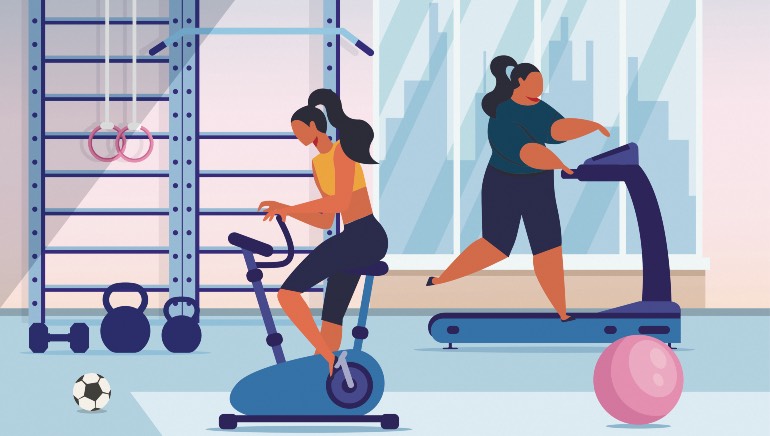
Treading on the path of fitness and weight loss isn’t easy. What makes it worse it the widespread of fad diets and restrictive approach to eating, that makes you lose your mind instead of the extra weight.
After all, haven’t we all given keto diet/low-carb diet/eat-small-meals-every-2-hours/calorie restriction a fair chance, only to give in to hunger and eat like a maniac when we lose control? And haven’t we all felt guilty about eating what we love too?
But, what if we told you that the best and long-lasting approach to healthy eating is listening to your body and eating what you want?
D-uh! We’re talking about ‘intuitive eating’
Surely, the 90’s remain close to your heart because of your glorious childhood memories. But the 90’s also saw the rise of the revolutionary method of eating called ‘intuitive eating’. In 1995, two U.S.-based renowned dieticians, Evelyn Tribole and Elyse Resch, dropped in this concept with the idea of improving our love-hate, complicated relationship with food and defined it as “a self-care eating framework, which integrates instinct, emotion, and rational thought.”
Basically, it involves rejecting the so-called “diet rules” and eating the food that makes your body feel good—without the fear of judgement/guilt/adhering to influence of the diet culture.
“Intuitive eating is an approach to health and wellness that assists you to tune into your body signals, break the cycle of habitual dieting, and heal your relationship with food,” explains Ms. Avni Kaul, nutritionist, wellness coach, and founder of NutriActivania, Delhi.
In fact, according to Kaul, if practiced right, intuitive eating can give you a host of benefits which are as follows:
So, how can you practice intuitive eating?
Tribole and Resch have clearly laid out the rules of this eating approach in their book called Intuitive Eating: A Revolutionary Program that Works. So, here’s presenting the factors that you need to keep in mind if you want to give it a try:
Reject the diet mentality: From social media to magazines to television, whatever it is that prompts you to follow restrictive diets has got to be kicked out of your life for good. Because not only can they mislead you into following fad diets that can cause nutritional deficiencies in your body, but they can also make you feel really guilty about not adhering to the said rules of dieting and spoil your relationship with food altogether.
Honour your hunger: Starving yourself or ignoring your hunger is ultimately going to lead to food cravings and make you to pounce on food and binge eat when you finally lose control. Hence, eat when you’re hungry and eat till you’re full.
Select Topics of your interest and let us customize your feed.
PERSONALISE NOWAlso, Read: This rajma salad will satisfy your chatpata cravings and keep your weight in check

Make peace with food: Food is food. It’s neither good nor bad. These are just labels we put on them according to our sweet convenience. Surely, a packet of chips isn’t the healthiest option for you, but an occasional binge in moderation is not going to do you any harm. However, if you resist or restrict yourself, you might just end up binge eating them in excess and feeling guilty about it later.
That said, it’s important to embrace healthy eating as well. Certain foods can make your body feel healthier and better. You’ve got to keep in mind the nutritional value of what you’re eating as well. It’s all about creating the right balance between nutrition and taste.
Feel your fullness: Eating till you feel satiated is important as dissatisfaction post a meal can prompt you to binge on snacks excessively and even make you feel irritated.
Since your brain takes almost 20 minutes to send signals of ‘satisfaction’ to your body, the best way is to chew your food properly, eat slowly, and pause between the meal to determine if you’re feeling full. Basically, the idea is to listen to your body, you see?
“Getting back in touch with the experience of eating and enjoying the food is important. So, be aware of what you’re eating and eat without distractions while focussing on the sight, smell, taste, and texture of the food,” suggest Kaul.
Discover the satisfaction factor: Another principle to keep in mind here is that eating what is prescribed till you’re full instead of eating what you feel like can also lead to dissatisfaction. Hence, you’ve definitely got to honour your body’s calling and eat what you’re craving for, while keeping the moderation factor into consideration, of course.
“By letting yourself eat what you feel like, you can prevent food cravings and overeating,” says Kaul.
Don’t use food to cope with your emotions: Relying on an ice-cream tub or a full-sized pizza in times of celebration, sadness, or confusion doesn’t fall under intuitive eating, girls. That’s nothing, but emotional eating.
“Emotional hunger involves using food to make yourself feel better/to fulfill your emotional needs rather than fulfilling your hunger. One tends to eat based on how he/she feels, rather than what the body needs,” Kaul points out.
“Physical hunger is eating in response to the need of the body to provide energy to carry out various bodily functions. Your body starts to provide cues such as stomach grumbling, headache, and fatigue/exhaustion when it needs to get refueled,” she adds.
Don’t get confused between the two and stop using food to cope with your emotions, okay?
Respect your body: Acceptance is key here. If you don’t like the way you look and are too critical of your body, then you can never eat without feeling guilty about it. Basically, a negative body-image acts as a barrier when it comes to improving your relationship with food.

Exercise, exercise, exercise: Not only can exercising help you burn a few extra calories, it’s also a great way to improve your overall health, boost your mood, and improve your body-image issues too. Focus on how your workout makes you feel and uplifts your mood rather than focussing on how many inches it can make you lose.
Should you try intuitive eating?
There’s no denying the fact that restriction or trying too hard to play by the diet rules can get to you eventually, spoil your relationship with food, and even lead to weight gain in the long run. Hence, intuitive eating is defo worth a try.
However, Kaul warns that this eating approach needs to be fully understood and not be confused with emotional eating. It should also be backed by a certain sense of mindfulness, wherein you understand how the food you’re eating will affect your body and health and the importance of eating what you like in moderation.